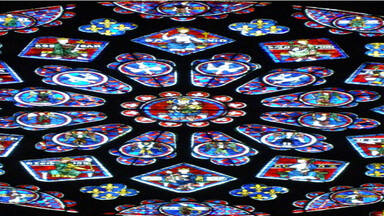Elaboration of a thematic paper proposing to the States Parties to the World Heritage Convention general guidance regarding the management of their cultural and natural heritage of religious interest.
This could be ensured through a global thematic survey, a case-study approach, associated research and data analysis, as well as the organization, in close coordination with the States Parties, the Advisory Bodies and all other partners concerned, of the meetings, conferences, workshops and activities within the framework of the preparation of this thematic paper.
The States Parties are invited to actively contribute to this global thematic survey by identifying case studies which illustrate interlinkage between the Outstanding Universal Value and associative sacred values, trans-thematic interaction between the World Heritage Programmes and Initiatives, as well as inter-Conventions synergy.
Research programme
The multidisciplinary research programme proposal is developed in support to the elaboration, by the World Heritage Centre/Advisory Bodies Steering Group, of a thematic paper proposing to the States Parties to the World Heritage Convention general guidance regarding management of cultural and natural heritage of religious interest, requested by the World Heritage Committee.
This research programme could be proposed to be implemented by the relevant UNESCO Chairs specialized in the domain of World Heritage and Intercultural / Interreligious Dialogue.
Data analysis
The principal objective of the Keyword Research System project is to inventor, by creation of a database of all World Heritage properties of religious interest, both the major threats to which the World Heritage properties of religious interest are exposed and the shortcomings in their management systems.
This system is one of the main tools necessary for the elaboration of a thematic paper proposing to States Parties the general guidance regarding the management of cultural and natural heritage of religious interest, requested by the Committee.
Case study approach
The case-study approach aims to define the main principles for building general guidance for World Heritage properties of Religious Interest, seeking to understand the needs, challenges and best practices for the recognition and management of properties with associative sacred or spiritual values, including sites with living religious practices.
Thematic study
The World Heritage Committee at its 36th session (St. Petersburg, 2012) noted the recommendations of the International World Heritage Expert Meeting on Criterion (vi) and Associated Values hosted by the Government of Poland in Warsaw, Poland (28-30 March 2012), and also noted the need for thematic studies on certain types of sites with associative values, such as sacred sites and those associated with the heritage of science (Decision 36 COM 13.I, paragraph 5).
The meeting recommended the development of further in-depth guidance on the recognition and management of cultural associations as part of the Outstanding Universal
Value of properties and on the appropriate use of the various criteria for such recognition.
Draft General Guidance
There is now considerable guidance on the management of World Heritage properties and the objectives of such management. This is contained in the Operational Guidelines for the Implementation of the World Heritage Convention, the Resource Manuals for the management of natural and cultural World Heritage, and much other guidance. Apart from this, the World Heritage Committee has agreed specific policies on issues such as disaster risk management, climate change and the integration of a sustainable development perspective into the processes of the Convention.
Nonetheless, there is still a need for guidance on the management of particular categories of property, including those of religious interest (the term ‘religious interest’ is to be understood broadly to cover both religion and spiritual traditions) . In any system of categorization of World Heritage properties, it is important to be aware that no classification can be exclusive. A property with religious interest could also be of archaeological interest, part of a cultural landscape or of an urban area with wide-ranging values. Natural properties, too, can have considerable religious interest. Management of World Heritage properties has to include all such interests.
Guidance on the management of properties of religious/ sacred/ spiritual value, or of any other thematic category must therefore be written within the context of general advice and policy on managing World Heritage properties, and should supplement and develop that guidance to cover issues especially relevant to properties of that particular category.
A first outline for draft recommendations on Guidance for management of World Heritage properties of religious interest (restricted access) has been discussed by the participants of the Thematic Expert Consultation meetings on sustainable management of World Heritage properties of religious interest.
It will be finalized upon its revision following all relevant regional Thematic Expert Consultations.
Recommendations on Guidance PRISM
(available for comments with restricted access – password will be provided upon request to the National Focal Points designated for by the States Parties for this activity).

